The Chinese car industry is making huge inroads into European markets and while some Euro manufacturers are signing deals with Asia, others are looking for legislation to limit imports
The Financial Times in the UK has carried a story that a major European aluminium producer has warned that the increasing numbers of imported electric cars from China could have a big impact on regional demand.
Hilde Merete Aasheim, chief executive of Norsk Hydro, told the Financial Times yesterday (Oct 31) that the company was paying attention to this risk. “The fear when it comes to [electric vehicles] is imports into Europe and the impact on European car manufacturers – there is quite a steep curve right now,” she told the Financial Times in an interview.
“That is a threat that we are following: if European automakers start reducing their demand [for aluminium] because they are outcompeted,” she said. Her comments highlight the ripple effects from growing Chinese EV imports for businesses in Europe from the car supply chain including raw material producers.
“Aluminium is used in electric cars for battery pack casings and other components to help cut weight and offset the heavy battery, allowing EVs to travel further on a single charge. The average EV produced in Europe in 2022 contained 283kg of aluminium, compared with 169kg for combustion engines, according to a study commissioned by European Aluminium, a trade body.”
“In September, the EU announced plans for an anti-subsidy probe of Chinese EVs that it said was “distorting” the European market and “flooding” global markets. China is building battery plants far beyond levels needed to meet domestic demand, backed by regional subsidies and lending, and manufacturers are seeking to channel the excess supply into overseas markets.
Read the full story Financial Times story HERE
Return to Decarbonisation News Index
Other stories which may interest you:
Ford pauses a $12 billion EV investment, after saying electric vehicles are too expensive





